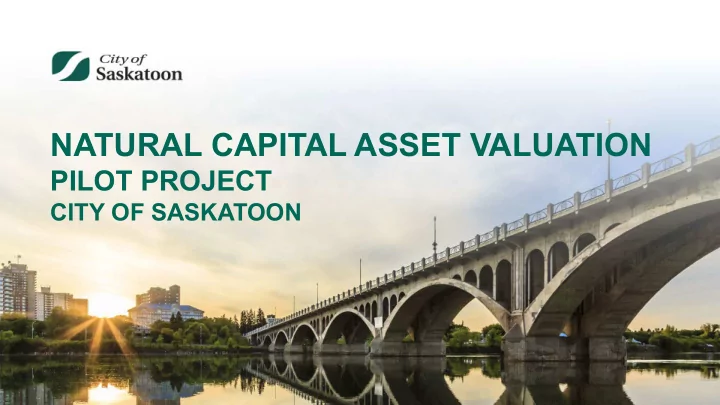

NATURAL CAPITAL ASSET VALUATION PILOT PROJECT CITY OF SASKATOON
Presentation Overview 1. Natural Capital Asset Valuation - pilot project 2. Definitions 3. Valuation Framework 4. Natural Areas Inventory 5. Vulnerability Assessment 6. Natural Assets - pilot project 7. Valuation Results 8. Conclusion 9. Next steps
Pilot Project Goals Develop a proposed framework for valuation of natural assets for the City of Saskatoon; Create an inventory of municipal natural assets for the City; Conduct a basic vulnerability assessment for natural assets within city limits; and Complete a pilot valuation for these natural assets.
Definitions Municipal natural assets refer to the stocks of natural resources or ecosystems that contribute to the provision of one or more services required for the health, well-being and long-term sustainability of a community and its residents. (Municipal Natural Assets Initiative, 2017).
Definitions Ecosystem services are the benefits people derive from functioning ecosystems, the ecological characteristics, functions, or processes that directly or indirectly contribute to human well-being. (United Nations Millennium Ecosystem Assessment, 2005)
Valuation Framework
Natural Areas Inventory
Vulnerability Assessment
Pilot Valuation Area 1. Small Swale Land cover Area (ha) % Wetland 18 11 Grassland 144 89 Forest/Shrubland 0 0 Total 162 100
Pilot Valuation Area 2. Richard St. Barbe Baker Afforestation area, including the Northwest Section of Chappell Marsh Land cover Area (ha) % Wetland 7 5 Grassland 67 51 Forest/Shrubland 58 44 Total 132 100
Ecosystem Services
Valuation Method The value (benefit) transfer method was used to assign values to ecosystem services for the pilot. This method involves borrowing an existing value estimated for a similar ecosystem. - from other studies in Saskatchewan - from the global ecosystem service valuation database.
Valuation Results
Valuation Results: Cultural Services The cultural value has been underestimated.
Valuation Results: City-wide The total value of Saskatoon’s natural assets identified by the Natural Areas Inventory is estimated as $48.2 million per year .
Valuation Results: City-wide
Conclusion Valuation can help to: Identify and quantify the value (with greater accuracy) of ecosystem services provided by natural assets; Develop a framework for natural asset accounting; Develop indicators to track ecosystem health by measuring the status of natural assets; Identify risks to ecosystem services, such as the loss of soil or water quality; Prioritize actions to strengthen natural assets; and Manage and fund natural assets consistently.
Conclusion Challenges: Lack of policy to direct valuation of natural assets; Lack of experience in applying this new approach to asset management; Lack of information about the use and health of natural assets in general; and Inability to reflect natural assets in the financial statements of the corporation as these values cannot currently be audited.
Next Steps Asset Management Opportunity to consider management of natural assets while improving asset management of engineered and enhanced assets; Alignment with actions and initiatives proposed by: Green Infrastructure Strategy and Corporate Climate Adaptation Plan
Thank-you!
Recommend
More recommend